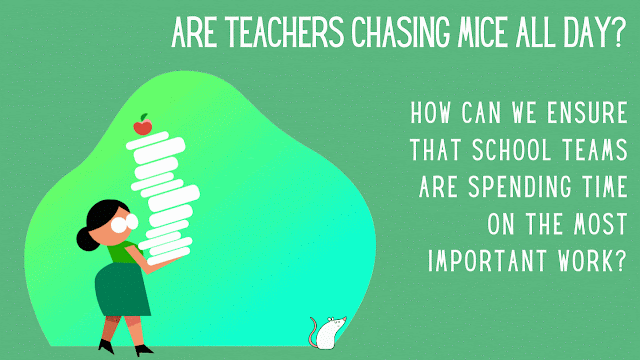Are Teachers chasing mice all day? How can school teams spend their time on the most important work?
The idea: Work that impacts student learning is the most important work. We need to to prioritize this work over less important tasks that fall on a teachers' plate. This can be done by (1) Prioritizing - knowing which tasks are most important and making time to do them first; (2) Optimizing - ensuring that productivity and collaboration are happening in the most optimal way possible; (3) Empowering the team to prioritize their work and optimize their time effectively.
Have you heard about the Lion that chases field mice?
I heard this amazing analogy from Tim Ferris in his book 'Tools of Titans'. He picked it out from a speech by Newt Gingrich which I will paste here:
"A lion is fully capable of capturing, killing, and eating a field mouse. But it turns out that the energy required to do so exceeds the caloric content of the mouse itself. So a lion that spent its day hunting and eating field mice would slowly starve to death. A lion can't live on field mice. A lion needs antelope. Antelope are big animals. They take more speed and strength to capture and kill, and once killed, they provide a feast for the lion and her pride. ... So ask yourself at the end of the day, 'Did I spend today chasing mice or hunting antelope?"
We all know the school teams never have enough time to do everything - teach all things we want to teach, review all the student work, connect with students, collaborate with peers and other experts, learn something new. So it is so important for us to ask ourselves - Are we spending our time on small, less important tasks (chasing mice) , often resulting in teacher burnout? or are we using our limited time for the most important work (the antelope)?
We need to be spending our time and energy chasing the antelope - which in our world is STUDENT LEARNING (yes, you guessed wrong - it is the unimportant tasks that are the mice, not your students!)
Work that impacts student learning is the most important work. Prioritize it.
Teachers are important and so is their time.
We know teachers are important. Research says Teachers have the #1 influence on student learning.
Teachers need time to be these amazing, high impact teachers.
Teachers need time to create great lessons. Planning a good lesson is time consuming, and usually no teacher has enough time to plan the lesson of their dreams during the school day. In addition to this, good teaching involves thoughtful review of student work, which is equally time consuming.
Teachers need time to build connectedness with the students - to know them and to be available to support.
Teachers need time to learn from each other - to share and reflect together with an aim to continuously improve.
In reality, Teachers don’t have a lot of time to do the important stuff.
Too often, competing demands from different parts of the school - coordination of events, field trips, administrative documentation, co-curricular responsibilities, exam supervision, inefficient staff meetings etc. are added to their core responsibilities. As a school or organization gets larger, this usually gets worse.
When teachers are spending most of their time doing these things instead of their core functions listed above, they cannot be effective teachers who maximize student learning.
And often it even leads to teacher burnout.
How can we help teachers to spend their time on the most important work?
1. Prioritize the most important work:
Leaders should ensure that teams have enough time for core responsibilities that directly impact the quality of student learning. These include planning, reviewing student work, spending time with students, collaborating and reflecting with peers to improve teaching and learning.
This means that for a few lower priority things, leaders and teacher must evaluate if teachers have the bandwidth to do these in addition to the above core responsibilities, or if it will interfere with those. These include staff meetings, administrative documentation and data entry, supervision of students, coordinating events etc. If these interfere with the core responsibilities, leaders need to find creative ways to reduce or remove less important tasks for their team.
Leaders also need to be vigilant about the many small requests coming to teachers from different departments or leaders across the school. These are usually small things, but they can all add up to a lot of non-essential work. School leaders need to take stock and if necessary, intercept these to safeguard the time of their team.
Get teacher input while prioritizing. Well-intentioned leaders may not be able to support teachers effectively unless they make time to listen to teachers in order to understand what they are spending their time on. Since our ultimate goal is to make time for teachers core responsibilities, their input is very valuable.
2. Optimize productivity and collaboration:
In addition to prioritizing most tasks, leaders need to support the team in developing the skills for optimizing these processes. Technology can play a huge role here. Something as simple as Google Workspace for Education can transform the efficiency of the organization by enhancing productivity and collaboration. Leaders can support by bringing in these tools and providing the necessary training for successful adoption.
3. Build the team’s capacity to prioritize work and optimize time:
Empower the team with a ‘Systems’ perspective to help teams be more accommodating
Helping teams become aware of what other teachers or teams in the organization can empower individuals to be better at prioritizing important tasks. How? Awareness of what others are working on builds empathy. This understanding helps individuals and teams work together to choose what is most important with the shared goal of student learning in mind, instead of simply advocating for their own task to be done first.
As leaders we often have a system’s view of what is going on, that teachers and many school departments do not have. It is our responsibility to help teams build awareness of this interlinked system and the work of other departments.
Equip Teachers with the skills to prioritize
Thinking skills: It is essential for leaders to build their teams metacognitive abilities and provide them with thinking tools to prioritize better. This can happen in coaching them/ thinking through with them in context or even by introducing them to thinking frames like the Eisenhower matrix.
Productivity skills: After introducing productivity tools like Google Workspace for Education, it is important to empower the team with the skills to use those tools effectively. Scheduling time on calendar for meetings and independent work time, blocking time for essential tasks, using task lists to keep track, email prioritization - what to keep in your inbox, what to send and what not to send etc.
Communication skills: Help the team communicate their workload and priorities to others, sincerely and respectfully (this is a whole other blog). I have also used tools like the Left-hand Column tool to support more productive dialogue. As mentioned in the opening story, simple honest communication can help collaboration and effective prioritization of work go a long way!
Ending with a personal anecdote:
This month our admissions team requested a few leaders in our school to support them with interactions with prospective parents every Saturday for a month. I shared with the admissions team that we want to support this time-sensitive plan because it can be helpful for prospective parents but this month was also exceptionally busy for our academic team. When I communicated this, they were more than happy to readjust the frequency so that we could prioritize our core responsibilities, and we worked out a win-win schedule for both the admissions and academic teams.
Other not-so-great ways this situation could have gone are
1. We could have said nothing, and just done the task, but continued to feel overwhelmed with work, spent less time on high priority tasks, probably been more irritable in our interactions and maybe even grudged the admissions team for filling our busy month with these seemingly less important tasks. OR
2. We could have refused to do this by explaining that we were just ‘too busy’, leaving the admissions team feeling like we don’t care enough to support their work and probably having a negative impact on future collaborations between two wonderful teams.
Prioritize, Optimize, Communicate in your teams for the highest impact!








Comments
Post a Comment